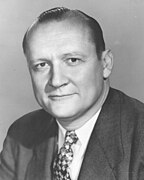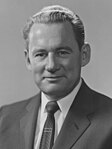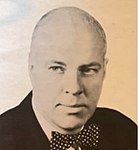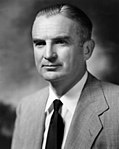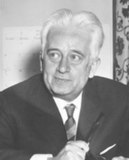The 1958 United States Senate elections were elections for the United States Senate which occurred in the middle of President Dwight D. Eisenhower's second term. Thirty-two seats of Class 1 were contested in regular elections, the new state of Alaska held its first Senate elections for its Class 2 and 3 seats, and two special elections were held to fill vacancies.
| ||||||||||||||||||||||||||||||||||||||||
36 of the 98 seats in the United States Senate 50 seats needed for a majority | ||||||||||||||||||||||||||||||||||||||||
|---|---|---|---|---|---|---|---|---|---|---|---|---|---|---|---|---|---|---|---|---|---|---|---|---|---|---|---|---|---|---|---|---|---|---|---|---|---|---|---|---|
| ||||||||||||||||||||||||||||||||||||||||
 | ||||||||||||||||||||||||||||||||||||||||
| ||||||||||||||||||||||||||||||||||||||||
As is common in mid-term elections, the party in the White House lost seats, but losses this year were heavy due to the Recession of 1958, the Eisenhower Administration's position on right-to-work issues that galvanized labor unions which supported Democrats, and the launch of Sputnik. This was the first time since 1934 that Democrats gained seats in this class of Senators. Democrats won both seats in West Virginia, making the last time that Democrats simultaneously flipped both of a state's Senate seats until Georgia's elections in 2020 and 2021.
The Democratic Party gained a record 15 seats in this election, defeating 10 Republican incumbents, gaining three open Republican seats, and winning both seats from the new state of Alaska. This gave the Democrats a strong Senate majority of 64–34 over the Republicans, and the largest swing in the history of the Senate. After the new state of Hawaii elected its first Senators in 1959, the Senate's balance changed to 65–35.
This is only one of two occasions in U.S. history that 10 or more Senate seats changed hands in a mid-term election (the other being in 1946), and also one of five occasions where 10 or more Senate seats changed hands in an election, with the other occasions being in 1920, 1932, 1946, and 1980.
Results summary
edit| 64 | 34 |
| Democratic | Republican |
For the November 5 and 25, 1958 regular and special elections.
Colored shading indicates party with largest share of that row.
| Parties | Total | ||||||||||||||||||||||||||||||||||||||||||||||||||||||||||||||||||||||||||||||||||||||||||||||||||
|---|---|---|---|---|---|---|---|---|---|---|---|---|---|---|---|---|---|---|---|---|---|---|---|---|---|---|---|---|---|---|---|---|---|---|---|---|---|---|---|---|---|---|---|---|---|---|---|---|---|---|---|---|---|---|---|---|---|---|---|---|---|---|---|---|---|---|---|---|---|---|---|---|---|---|---|---|---|---|---|---|---|---|---|---|---|---|---|---|---|---|---|---|---|---|---|---|---|---|---|
| Democratic | Republican | Other | |||||||||||||||||||||||||||||||||||||||||||||||||||||||||||||||||||||||||||||||||||||||||||||||||
| Last elections (1956) Before these elections | 49 | 47 | 0 | 96 | |||||||||||||||||||||||||||||||||||||||||||||||||||||||||||||||||||||||||||||||||||||||||||||||
| Not up | 36 | 26 | 0 | 62 | |||||||||||||||||||||||||||||||||||||||||||||||||||||||||||||||||||||||||||||||||||||||||||||||
| Class 2 (1954) | 19 | 11 | 0 | 30 | |||||||||||||||||||||||||||||||||||||||||||||||||||||||||||||||||||||||||||||||||||||||||||||||
| Class 3 (1956) | 17 | 15 | 0 | 32 | |||||||||||||||||||||||||||||||||||||||||||||||||||||||||||||||||||||||||||||||||||||||||||||||
| Up | 13 | 21 | — | 34 | |||||||||||||||||||||||||||||||||||||||||||||||||||||||||||||||||||||||||||||||||||||||||||||||
| Class 1 (1952→1958) | 12 | 20 | — | 32 | |||||||||||||||||||||||||||||||||||||||||||||||||||||||||||||||||||||||||||||||||||||||||||||||
| Special: Class 2 | 1 | 1 | — | 2 | |||||||||||||||||||||||||||||||||||||||||||||||||||||||||||||||||||||||||||||||||||||||||||||||
| Incumbent retired | 0 | 6 | — | 6 | |||||||||||||||||||||||||||||||||||||||||||||||||||||||||||||||||||||||||||||||||||||||||||||||
| Held by same party | 0 | 3 | — | 3 | |||||||||||||||||||||||||||||||||||||||||||||||||||||||||||||||||||||||||||||||||||||||||||||||
| Replaced by other party |  3 Republicans replaced by 3 Republicans replaced by  3 Democrats 3 Democrats | — | 3 | ||||||||||||||||||||||||||||||||||||||||||||||||||||||||||||||||||||||||||||||||||||||||||||||||
| Result | 3 | 3 | 0 | 6 | |||||||||||||||||||||||||||||||||||||||||||||||||||||||||||||||||||||||||||||||||||||||||||||||
| Incumbent ran | 13 | 15 | — | 28 | |||||||||||||||||||||||||||||||||||||||||||||||||||||||||||||||||||||||||||||||||||||||||||||||
| Won re-election | 13 | 5 | — | 18 | |||||||||||||||||||||||||||||||||||||||||||||||||||||||||||||||||||||||||||||||||||||||||||||||
| Lost re-election |  10 Republicans replaced by 10 Republicans replaced by  10 Democrats 10 Democrats | — | 10 | ||||||||||||||||||||||||||||||||||||||||||||||||||||||||||||||||||||||||||||||||||||||||||||||||
| Lost renomination, but held by same party | 0 | 0 | — | 0 | |||||||||||||||||||||||||||||||||||||||||||||||||||||||||||||||||||||||||||||||||||||||||||||||
| Result | 23 | 5 | 0 | 28 | |||||||||||||||||||||||||||||||||||||||||||||||||||||||||||||||||||||||||||||||||||||||||||||||
| New state | 2 | 0 | 0 | 2 | |||||||||||||||||||||||||||||||||||||||||||||||||||||||||||||||||||||||||||||||||||||||||||||||
| Total elected | 28 | 8 | 0 | 36 | |||||||||||||||||||||||||||||||||||||||||||||||||||||||||||||||||||||||||||||||||||||||||||||||
| Net gain/loss |  15 15 |  13 13 |  | 15 | |||||||||||||||||||||||||||||||||||||||||||||||||||||||||||||||||||||||||||||||||||||||||||||||
| Nationwide vote | 21,426,124[b] | 16,622,338 | 678,147 | 38,726,609 | |||||||||||||||||||||||||||||||||||||||||||||||||||||||||||||||||||||||||||||||||||||||||||||||
| Share | 55.33% | 42.92% | 1.75% | 100% | |||||||||||||||||||||||||||||||||||||||||||||||||||||||||||||||||||||||||||||||||||||||||||||||
| Result | 64 | 34 | 0 | 98 | |||||||||||||||||||||||||||||||||||||||||||||||||||||||||||||||||||||||||||||||||||||||||||||||
Source: Clerk of the U.S. House of Representatives[1]
Gains, losses, and holds
editRetirements
editSix Republicans retired instead of seeking re-election.
Defeats
editTen Republicans sought re-election but lost in the general election.
New states
editAlaska was admitted into the Union and elected two Democrats to the Senate.
| State | Senator |
|---|---|
| Alaska (class 2) | Bob Bartlett |
| Alaska (class 3) | Ernest Gruening |
Post-election states
editHawaii was admitted into the Union and elected one Democrat and one Republican to the Senate on July 28, 1959.
| State | Senator |
|---|---|
| Hawaii (class 1) | Hiram Fong |
| Hawaii (class 3) | Oren E. Long |
Post election changes
editTwo Democrats left the Senate after the election. Both seats were filled by Democrats.
| State | Senator | Replaced by |
|---|---|---|
| Oregon | Richard L. Neuberger | Hall S. Lusk |
| Missouri | Thomas C. Hennings Jr. | Edward V. Long |
Change in composition
editBefore the elections
edit| D1 | D2 | D3 | D4 | D5 | D6 | D7 | D8 | D9 | |
| D19 | D18 | D17 | D16 | D15 | D14 | D13 | D12 | D11 | D10 |
| D20 | D21 | D22 | D23 | D24 | D25 | D27 | D26 | D28 | D29 |
| D39 Miss. Ran | D38 Mass. Ran | D37 Fla. Ran | D36 | D35 | D34 | D33 | D32 | D31 | D30 |
| D40 Mo. Ran | D41 Mont. Ran | D42 N.M. Ran | D43 N.C. (sp) Ran | D44 R.I. Ran | D45 Tenn. Ran | D46 Texas Ran | D47 Va. Ran | D48 Wash. Ran | D49 Wis. Ran |
| Majority ↑ | TBD1 Ak. (cl. 3) New state | ||||||||
| R40 N.D. Ran | R41 Ohio Ran | R42 Pa. Retired | R43 Utah Ran | R44 Vt. Retired | R45 W.Va. (reg) Ran | R46 W.Va. (sp) Ran | R47 Wyo. Ran | TBD2 Ak. (cl. 2) New state | |
| R39 N.Y. Retired | R38 N.J. Retired | R37 Nev. Ran | R36 Neb. Ran | R35 Minn. Ran | R34 Mich. Ran | R33 Md. Ran | R32 Maine Ran | R31 Ind. Retired | R30 Del. Ran |
| R20 | R21 | R22 | R23 | R24 | R25 | R26 | R27 Ariz. Ran | R28 Calif. Retired | R29 Conn. Ran |
| R19 | R18 | R17 | R16 | R15 | R14 | R13 | R12 | R11 | R10 |
| R1 | R2 | R3 | R4 | R5 | R6 | R7 | R8 | R9 | |
After the elections
edit| D1 | D2 | D3 | D4 | D5 | D6 | D7 | D8 | D9 | |
| D19 | D18 | D17 | D16 | D15 | D14 | D13 | D12 | D11 | D10 |
| D20 | D21 | D22 | D23 | D24 | D25 | D26 | D27 | D28 | D29 |
| D39 Miss. Re-elected | D38 Mass. Re-elected | D37 Fla. Re-elected | D36 | D35 | D34 | D33 | D32 | D31 | D30 |
| D40 Mo. Re-elected | D41 Mont. Re-elected | D42 N.M. Re-elected | D43 N.C. (sp) Elected[c] | D44 R.I. Re-elected | D45 Tenn. Re-elected | D46 Texas Re-elected | D47 Va. Re-elected | D48 Wash. Re-elected | D49 Wis. Re-elected |
| Majority → | D50 Ak. (cl. 2) Gain | ||||||||
| D59 N.J. Gain | D58 Nev. Gain | D57 Minn. Gain | D56 Mich. Gain | D55 Maine Gain | D54 Ind. Gain | D53 Conn. Gain | D52 Calif. Gain | D51 Ak. (cl. 3) Gain | |
| D60 Ohio Gain | D61 Utah Gain | D62 W.Va. (reg) Gain | D63 W.Va. (sp) Gain[d] | D64 Wyo. Gain | R34 Vt. Hold | R33 Pa. Hold | R32 N.D. Re-elected | R31 N.Y. Hold | R30 Neb. Re-elected |
| R20 | R21 | R22 | R23 | R24 | R25 | R26 | R27 Ariz. Re-elected | R28 Del. Re-elected | R29 Md. Re-elected |
| R19 | R18 | R17 | R16 | R15 | R14 | R13 | R12 | R11 | R10 |
| R1 | R2 | R3 | R4 | R5 | R6 | R7 | R8 | R9 | |
| Key: |
|
|---|
Race summaries
editSpecial / new state elections
editIn the special elections, the winners were seated during 1958 or before January 3, 1959. In the new state elections, the winners were seated with the new Congress on January 3, 1959. Ordered by election date.
| State | Incumbent | Results | Candidates | ||
|---|---|---|---|---|---|
| Senator | Party | Electoral history | |||
| North Carolina (class 2) | B. Everett Jordan | Democratic | 1958 (Appointed) | Interim appointee elected November 4, 1958. |
|
| West Virginia (class 2) | John D. Hoblitzell, Jr. | Republican | 1958 (Appointed) | Interim appointee lost election. New senator elected November 4, 1958. Democratic gain. |
|
| Alaska (class 2) | Alaska admitted as a state January 3, 1959. | New state. New senator elected November 25, 1958. Democratic gain. |
| ||
| Alaska (class 3) | New state. New senator elected November 25, 1958. Democratic gain. |
| |||
Elections leading to the next Congress
editIn these regular elections, the winners were elected for the term beginning January 3, 1959; ordered by state.
All of the elections involved the Class 1 seats.
| State | Incumbent | Results | Candidates | ||
|---|---|---|---|---|---|
| Senator | Party | Electoral history | |||
| Arizona | Barry Goldwater | Republican | 1952 | Incumbent re-elected. |
|
| California | William Knowland | Republican | 1945 (Appointed) 1946 (special) 1952 | Incumbent retired to run for California Governor. New senator elected. Democratic gain. |
|
| Connecticut | William A. Purtell | Republican | 1952 (Appointed) 1952 (Retired) 1952 | Incumbent lost re-election. New senator elected. Democratic gain. |
|
| Delaware | John J. Williams | Republican | 1946 1952 | Incumbent re-elected. |
|
| Florida | Spessard Holland | Democratic | 1946 (Appointed) 1946 1952 | Incumbent re-elected. |
|
| Indiana | William E. Jenner | Republican | 1944 (special) 1946 1952 | Incumbent retired. New senator elected. Democratic gain. |
|
| Maine | Frederick G. Payne | Republican | 1952 | Incumbent lost re-election. New senator elected. Democratic gain. |
|
| Maryland | J. Glenn Beall | Republican | 1952 | Incumbent re-elected. |
|
| Massachusetts | John F. Kennedy | Democratic | 1952 | Incumbent re-elected. |
|
| Michigan | Charles E. Potter | Republican | 1952 (special) 1952 | Incumbent lost re-election. New senator elected. Democratic gain. |
|
| Minnesota | Edward J. Thye | Republican | 1946 1952 | Incumbent lost re-election. New senator elected. Democratic–Farmer–Labor gain. |
|
| Mississippi | John C. Stennis | Democratic | 1947 (special) 1952 | Incumbent re-elected. |
|
| Missouri | Stuart Symington | Democratic | 1952 | Incumbent re-elected. |
|
| Montana | Mike Mansfield | Democratic | 1952 | Incumbent re-elected. |
|
| Nebraska | Roman Hruska | Republican | 1954 (special) | Incumbent re-elected. |
|
| Nevada | George W. Malone | Republican | 1946 1952 | Incumbent lost re-election. New senator elected. Democratic gain. |
|
| New Jersey | Howard Alexander Smith | Republican | 1944 (special) 1946 1952 | Incumbent retired. New senator elected. Democratic gain. |
|
| New Mexico | Dennis Chávez | Democratic | 1935 (Appointed) 1936 (special) 1940 1946 1952 | Incumbent re-elected. |
|
| New York | Irving Ives | Republican | 1946 1952 | Incumbent retired. New senator elected. Republican hold. |
|
| North Dakota | William Langer | Republican | 1940 1946 1952 | Incumbent re-elected. |
|
| Ohio | John W. Bricker | Republican | 1946 1952 | Incumbent lost re-election. New senator elected. Democratic gain. |
|
| Pennsylvania | Edward Martin | Republican | 1946 1952 | Incumbent retired. New senator elected. Republican hold. |
|
| Rhode Island | John Pastore | Democratic | 1950 (special) 1952 | Incumbent re-elected. |
|
| Tennessee | Albert Gore Sr. | Democratic | 1952 | Incumbent re-elected. |
|
| Texas | Ralph Yarborough | Democratic | 1957 (special) | Incumbent re-elected. |
|
| Utah | Arthur V. Watkins | Republican | 1946 1952 | Incumbent lost re-election. New senator elected. Democratic gain. |
|
| Vermont | Ralph Flanders | Republican | 1946 (Appointed) 1946 (special) 1952 | Incumbent retired. New senator elected. Republican hold. |
|
| Virginia | Harry F. Byrd | Democratic | 1933 (Appointed) 1933 (special) 1934 1940 1946 1952 | Incumbent re-elected. |
|
| Washington | Henry M. Jackson | Democratic | 1952 | Incumbent re-elected. |
|
| West Virginia | Chapman Revercomb | Republican | 1942 1948 (Lost) 1956 (special) | Incumbent lost re-election. New senator elected. Democratic gain. |
|
| Wisconsin | William Proxmire | Democratic | 1957 (special) | Incumbent re-elected. |
|
| Wyoming | Frank A. Barrett | Republican | 1952 | Incumbent lost re-election. New senator elected. Democratic gain. |
|
Closest races
editEleven races had a margin of victory under 10%:
| State | Party of winner | Margin |
|---|---|---|
| Wyoming | Democratic (flip) | 1.6% |
| Maryland | Republican | 2.0% |
| New York | Republican | 2.4% |
| Utah | Democratic (flip) | 3.9% |
| Vermont | Republican | 4.4% |
| New Jersey | Democratic (flip) | 4.5% |
| Ohio | Democratic (flip) | 5.0% |
| Alaska (class 3) | Democratic (flip) | 5.2% |
| Minnesota | Democratic (flip) | 6.3% |
| Delaware | Republican | 6.6% |
| Michigan | Democratic (flip) | 7.5% |
Maine was the tipping point state with a margin of 21.6%.
Alaska
editAlaska would become a new state January 3, 1959, and it elected two initial senators November 25, 1958, in advance of statehood. The Democratic Party thereby picked up 2 more seats.
In their next elections, Alaska's senators would be elected to 6-year terms.
 | |||||||||||||||||
| |||||||||||||||||
| |||||||||||||||||
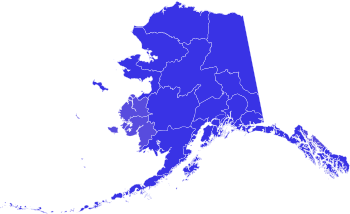 Results by election district Bartlett: 70–80% 80–90% | |||||||||||||||||
| |||||||||||||||||
The class 2 race, for the 2-year term ending in 1961, was between the Democratic incumbent territorial delegate Bob Bartlett, and the Republican Juneau attorney R. E. Robertson.
| Party | Candidate | Votes | % | ||
|---|---|---|---|---|---|
| Democratic | Bob Bartlett | 40,939 | 83.83 | ||
| Republican | R. E. Robertson | 7,299 | 14.95 | ||
| Write-In | Keith Capper | 599 | 1.23 | ||
| Majority | 33,640 | 68.88 | |||
| Turnout | 48,837 | ||||
| Democratic win (new seat) | |||||
Bartlett would be re-elected twice and serve until his death in 1968.
 | |||||||||||||||||
| |||||||||||||||||
| |||||||||||||||||
 Results by election district Gruening: 50–60% 60–70% 70–80% Stepovich: 50–60% 60–70% | |||||||||||||||||
| |||||||||||||||||
The class 3 race, for the 4-year term ending in 1963, pitted two former territorial governors, Democrat Ernest Gruening against Republican Mike Stepovich. Gruening won a close race.
| Party | Candidate | Votes | % | ||
|---|---|---|---|---|---|
| Democratic | Ernest Gruening | 26,045 | 52.61 | ||
| Republican | Mike Stepovich | 23,464 | 47.39 | ||
| Majority | 2,581 | 5.22 | |||
| Turnout | 49,509 | ||||
| Democratic win (new seat) | |||||
Gruening would be re-elected in 1962 and serve until losing renomination in 1968.
Arizona
edit | |||||||||||||||||
| |||||||||||||||||
| |||||||||||||||||
 County results Goldwater: 50–60% 60–70% McFarland: 50–60% 60–70% | |||||||||||||||||
| |||||||||||||||||
| Party | Candidate | Votes | % | |
|---|---|---|---|---|
| Republican | Barry Goldwater (Incumbent) | 164,593 | 56.06% | |
| Democratic | Ernest W. McFarland | 129,030 | 43.94% | |
| Majority | 35,563 | 12.12% | ||
| Turnout | 293,623 | |||
| Republican hold | ||||
California
edit | |||||||||||||||||
| |||||||||||||||||
| |||||||||||||||||
 County results Engle: 50–60% 60–70% 70–80% 80–90% Knight: 50–60% | |||||||||||||||||
| |||||||||||||||||
| Party | Candidate | Votes | % | |
|---|---|---|---|---|
| Democratic | Clair Engle | 2,927,693 | 57.01 | |
| Republican | Goodwin Knight | 2,204,337 | 42.93 | |
| Write-In | Jesse M. Ritchie | 892 | 0.02 | |
| Write-In | Ray B. Pollard | 281 | 0.01 | |
| None | Scattering | 2,018 | 0.04 | |
| Majority | 723,356 | 14.08 | ||
| Turnout | 5,135,221 | |||
| Democratic gain from Republican | ||||
Connecticut
edit | |||||||||||||||||
| |||||||||||||||||
| |||||||||||||||||
Dodd: 50–60% 60–70% 70–80% Purtell: 50–60% 60–70% 70–80% Tie: 50% | |||||||||||||||||
| |||||||||||||||||
In Connecticut, Democrat Thomas J. Dodd defeated incumbent senator William A. Purtell who ran for a second term.
| Party | Candidate | Votes | % | ||
|---|---|---|---|---|---|
| Democratic | Thomas J. Dodd | 554,841 | 57.28 | ||
| Republican | William A. Purtell (Incumbent) | 410,622 | 42.39 | ||
| Independent | Vivien Kellems | 3,043 | 0.31 | ||
| None | Scattering | 119 | 0.01 | ||
| Majority | 144,219 | 14.89 | |||
| Turnout | 968,625 | ||||
| Swing to Democratic from Republican | Swing | ||||
Delaware
edit | |||||||||||||||||
| |||||||||||||||||
| |||||||||||||||||
 County results Williams: 50–60% | |||||||||||||||||
| |||||||||||||||||
Two-term Republican John J. Williams was re-elected to a third term.
| Party | Candidate | Votes | % | |
|---|---|---|---|---|
| Republican | John J. Williams (Incumbent) | 82,280 | 53.28 | |
| Democratic | Elbert Carvel | 72,152 | 46.72 | |
| Majority | 10,128 | 6.56 | ||
| Turnout | 154,432 | |||
| Republican hold | ||||
Williams would be re-elected in 1964, serving four terms until his 1970 retirement.
Florida
edit | |||||||||||||||||
| |||||||||||||||||
| |||||||||||||||||
 County results Holland: 50–60% 60–70% 70–80% 80–90% >90% | |||||||||||||||||
| |||||||||||||||||
Incumbent Democrat Senator Holland, a conservative, was challenged by former senator Claude Pepper, who had been unseated in 1950. Holland had played a role in recruiting George A. Smathers to run against the liberal Pepper in that election. The two served as colleagues in the Senate from 1947 to 1951.[5]
| Party | Candidate | Votes | % | |
|---|---|---|---|---|
| Democratic | Spessard L. Holland (Incumbent) | 408,084 | 55.94 | |
| Democratic | Claude Pepper | 321,377 | 44.06 | |
| Total votes | 729,461 | 100.00 | ||
| Party | Candidate | Votes | % | ±% | |
|---|---|---|---|---|---|
| Democratic | Spessard Holland (Incumbent) | 386,113 | 71.23 |  28.59 28.59 | |
| Republican | Leland Hyzer | 155,956 | 28.77 |  28.77 28.77 | |
| Majority | 230,157 | 42.46 | |||
| Turnout | 542,069 | ||||
| Democratic hold | |||||
Indiana
edit | |||||||||||||||||
| |||||||||||||||||
| |||||||||||||||||
 County results Hartke: 40–50% 50–60% 60–70% Handley: 40–50% 50–60% 60–70% | |||||||||||||||||
| |||||||||||||||||
Incumbent Republican William E. Jenner did not seek a second full term in office and was replaced by Democrat Vance Hartke, the mayor of Evansville. Hartke defeated incumbent Republican Governor of Indiana Harold W. Handley.
Jenner resigned shortly before the election and urged Handley, Jenner's political protégé, to seek his seat. A plan was proposed whereby Handley would resign the governorship, his lieutenant would appoint him senator, and he would finish the term and run as an incumbent. When the plan was revealed to the party leadership, they strongly advised him to not implement it because they feared it would hurt the party and be perceived as a scandal.[8]
Handley did not resign from the governorship during his campaign and was widely criticized for the unprecedented action. Hartke accused Handley of raising taxes, breaking of his campaign promise, his reluctance in supporting right-to-work, and rising state unemployment. Statewide unemployment was just above 10% in April, but dropped to 6.9% by the end of September.[8]
| Party | Candidate | Votes | % | |
|---|---|---|---|---|
| Democratic | Vance Hartke | 973,636 | 56.47 | |
| Republican | Harold W. Handley | 731,635 | 42.43 | |
| Prohibition | John Stelle | 19,040 | 1.10 | |
| Majority | 242,001 | 14.04 | ||
| Turnout | 1,724,311 | |||
| Democratic gain from Republican | ||||
Maine
edit | |||||||||||||||||
| |||||||||||||||||
| |||||||||||||||||
 County Results Muskie: 50–60% 50–60% Payne: 50–60% | |||||||||||||||||
| |||||||||||||||||
Maine held its election September 8, 1958, in keeping with its routine practice of holding elections before the November national Election Day. Democrat Edmund Muskie defeated one-term Republican incumbent, Frederick G. Payne by a wide margin, 61–39%.
| Party | Candidate | Votes | % | |
|---|---|---|---|---|
| Democratic | Edmund Muskie | 172,704 | 60.76% | |
| Republican | Frederick G. Payne (Incumbent) | 111,522 | 39.24% | |
| Majority | 61,182 | 21.52% | ||
| Turnout | 284,226 | |||
| Democratic gain from Republican | ||||
Maryland
edit | |||||||||||||||||
| |||||||||||||||||
 County Beall: 50–60% 60–70% D'Alesandro: 50–60% | |||||||||||||||||
| |||||||||||||||||
| Party | Candidate | Votes | % | |
|---|---|---|---|---|
| Republican | J. Glenn Beall (Incumbent) | 384,931 | 51.18% | |
| Democratic | Thomas D'Alesandro Jr. | 367,142 | 48.82% | |
| Majority | 17,789 | 3.36% | ||
| Turnout | 752,073 | |||
| Republican hold | ||||
Massachusetts
edit | |||||||||||||||||
| |||||||||||||||||
| |||||||||||||||||
| |||||||||||||||||
| |||||||||||||||||
| Party | Candidate | Votes | % | |
|---|---|---|---|---|
| Democratic | John F. Kennedy (Incumbent) | 1,362,926 | 73.20% | |
| Republican | Vincent J. Celeste | 488,318 | 26.22% | |
| Socialist Labor | Lawrence Gilfedder | 5,457 | 0.29% | |
| Prohibition | Mark R. Shaw | 5,335 | 0.29% | |
| None | Scattering | 5 | 0.00% | |
| Majority | 874,608 | 46.98% | ||
| Turnout | 1,862,041 | |||
| Democratic hold | ||||
Michigan
edit | |||||||||||||||||
| |||||||||||||||||
| |||||||||||||||||
 County results Hart: 50–60% 60–70% Potter: 50–60% 60–70% 70–80% | |||||||||||||||||
| |||||||||||||||||
| Party | Candidate | Votes | % | |
|---|---|---|---|---|
| Democratic | Philip A. Hart | 1,216,966 | 53.57% | |
| Republican | Charles E. Potter (Incumbent) | 1,046,963 | 46.09% | |
| Prohibition | Elmer H. Ormiston | 3,518 | 0.15% | |
| Socialist Labor | James Sim | 3,128 | 0.14% | |
| Socialist Workers | Evelyn Sell | 1,068 | 0.05% | |
| None | Scattering | 1 | 0.00% | |
| Majority | 170,003 | 7.48% | ||
| Turnout | 2,271,644 | |||
| Democratic gain from Republican | ||||
Minnesota
edit | |||||||||||||||||
| |||||||||||||||||
| |||||||||||||||||
 County results McCarthy: 50–60% 60–70% 70–80% Thye: 50–60% 60–70% | |||||||||||||||||
| |||||||||||||||||
In Minnesota, Democratic Representative Eugene McCarthy defeated incumbent senator Edward John Thye who ran for a third term.
| Party | Candidate | Votes | % | |
|---|---|---|---|---|
| Democratic (DFL) | Eugene J. McCarthy | 279,796 | 75.65% | |
| Democratic (DFL) | Hjalmar Petersen | 76,340 | 20.64% | |
| Democratic (DFL) | Hans R. Miller | 13,736 | 3.71% | |
| Total votes | 369,872 | 100.00% | ||
| Party | Candidate | Votes | % | |
|---|---|---|---|---|
| Republican | Edward John Thye (Incumbent) | 224,833 | 91.81% | |
| Republican | Edward C. Slettedahl | 13,734 | 5.61% | |
| Republican | Mrs. Peder P. Schmidt | 6,332 | 2.58% | |
| Total votes | 244,899 | 100.00% | ||
| Party | Candidate | Votes | % | |
|---|---|---|---|---|
| Democratic (DFL) | Eugene J. McCarthy | 608,847 | 52.95% | |
| Republican | Edward John Thye (Incumbent) | 535,629 | 46.58% | |
| Socialist Workers | William M. Curran | 5,407 | 0.47% | |
| Total votes | 1,149,883 | 100.00% | ||
| Majority | 73,218 | 6.37% | ||
| Democratic (DFL) gain from Republican | ||||
Mississippi
edit | |||||||||||||||||
| |||||||||||||||||
| |||||||||||||||||
 County results Stennis: 100% | |||||||||||||||||
| |||||||||||||||||
Two-term Democrat John C. Stennis was re-elected with no opposition.
| Party | Candidate | Votes | % | |
|---|---|---|---|---|
| Democratic | John C. Stennis (Incumbent) | 61,039 | 100.00% | |
| Democratic hold | ||||
Stennis would be re-elected four more times, serving until his retirement in 1989.
Missouri
edit | |||||||||||||||||
| |||||||||||||||||
| |||||||||||||||||
 County results Symington: 50–60% 60–70% 80–90% >90% Palmer: 50–60% 60–70% | |||||||||||||||||
| |||||||||||||||||
Incumbent Democrat Stuart Symington was re-elected to a second term. Hazel Palmer was the first woman ever nominated for United States senator in Missouri.
| Party | Candidate | Votes | % | |
|---|---|---|---|---|
| Democratic | Stuart Symington (incumbent) | 365,470 | 92.13% | |
| Democratic | Lawrence Hastings | 19,954 | 5.03% | |
| Democratic | Lamar Dye | 11,262 | 2.84% | |
| Total votes | 396,686 | 100.00% | ||
| Party | Candidate | Votes | % | |
|---|---|---|---|---|
| Republican | Hazel Palmer | 61,481 | 44.63% | |
| Republican | William McKinley Thomas | 36,438 | 26.45% | |
| Republican | Homer Cotton | 27,023 | 19.62% | |
| Republican | Herman G. Grosby | 12,818 | 9.31% | |
| Total votes | 137,760 | 100.00% | ||
| Party | Candidate | Votes | % | ±% | |
|---|---|---|---|---|---|
| Democratic | Stuart Symington (Incumbent) | 780,083 | 66.45% |  12.46 12.46 | |
| Republican | Hazel Palmer | 393,847 | 33.55% |  12.39 12.39 | |
| Majority | 386,236 | 32.90% | |||
| Turnout | 1,173,930 | ||||
| Democratic hold | Swing | ||||
Montana
edit | |||||||||||||||||
| |||||||||||||||||
| |||||||||||||||||
 County results Mansfield: 50–60% 60–70% 70–80% 80-90% | |||||||||||||||||
| |||||||||||||||||
Incumbent Mike Mansfield, who was first elected to the Senate in 1952, ran for re-election. Mansfield won the Democratic primary comfortably, and moved on to the general election, where he was opposed by Lou W. Welch, a millworker and the Republican nominee. In contrast to the close campaign in 1952, Mansfield defeated Welch in a landslide and won his second term in the Senate easily.
| Party | Candidate | Votes | % | |
|---|---|---|---|---|
| Democratic | Mike Mansfield (Incumbent) | 97,207 | 91.72% | |
| Democratic | J. M. Nickey | 4,710 | 4.44% | |
| Democratic | Thomas G. Stimatz, former State Representative | 4,061 | 3.83% | |
| Total votes | 105,978 | 100.00% | ||
| Party | Candidate | Votes | % | |
|---|---|---|---|---|
| Republican | Lou W. Welch, millworker | 19,860 | 50.30% | |
| Republican | Blanche Anderson | 19,624 | 49.70% | |
| Total votes | 39,484 | 100.00% | ||
| Party | Candidate | Votes | % | ±% | |
|---|---|---|---|---|---|
| Democratic | Mike Mansfield (Incumbent) | 174,910 | 76.22% |  25.47% 25.47% | |
| Republican | Lou W. Welch | 54,573 | 23.78% |  24.77% 24.77% | |
| Majority | 120,337 | 52.44% |  50.25% 50.25% | ||
| Turnout | 229,483 | ||||
| Democratic hold | Swing | ||||
Nebraska
editRepublican Roman Hruska had won a 1954 special election and ran for a full term. He beat Democratic attorney Frank B. Morrison, who had previously lost his challenger bid for Nebraska's 1st congressional district.
 | |||||||||||||||||
| |||||||||||||||||
| |||||||||||||||||
 County results Hruska: 50–60% 60–70% 70–80% Morrison: 50–60% | |||||||||||||||||
| |||||||||||||||||
| Party | Candidate | Votes | % | |
|---|---|---|---|---|
| Democratic | Frank B. Morrison | 35,482 | 51.85 | |
| Democratic | Eugene D. O'Sullivan | 26,436 | 38.63 | |
| Democratic | Mike F. Kracher | 6,500 | 9.50 | |
| Democratic | Scattering | 13 | 0.02 | |
| Total votes | 68,431 | 100 | ||
| Party | Candidate | Votes | % | |
|---|---|---|---|---|
| Republican | Roman Hruska (Incumbent) | 103,348 | 99.95 | |
| Republican | Scattering | 51 | 0.05 | |
| Total votes | 103,399 | 100 | ||
| Party | Candidate | Votes | % | |
|---|---|---|---|---|
| Republican | Roman Hruska (Incumbent) | 232,227 | 55.64% | |
| Democratic | Frank B. Morrison | 185,152 | 44.36% | |
| N/A | Scattering | 6 | 0.00% | |
| Majority | 47,075 | 11.18% | ||
| Turnout | 417,385 | |||
| Republican hold | ||||
Hruska would be re-elected two more times and serve until his 1976 retirement.
Morrison would be elected Governor of Nebraska in 1960 and serve there for six years from 1961 to 1967, and was re-elected twice while running unsuccessfully for U.S. senator.
Nevada
edit | |||||||||||||||||
| |||||||||||||||||
| |||||||||||||||||
 County results Cannon: 50–60% 70–80% Malone: 50–60% 60–70% | |||||||||||||||||
| |||||||||||||||||
In Nevada, incumbent Republican George W. Malone ran for re-election to a third term, but was defeated by Democrat Howard Cannon.
The campaign was considered[by whom?] one of the most competitive and highly watched in the nation in 1958. Senator Malone was known nationally as a leader within the Republican Party's right wing and held key appointments on the Senate Finance and Interior Committees.[18]
Malone campaigned on his experience and seniority in the Senate, using the slogan "He Knows Nevada Best." He received support from Eisenhower cabinet secretaries Fred Seaton and Ezra Taft Benson. Benson, one of the Twelve Apostles of the Church of Jesus Christ of Latter-Day Saints, was especially influential among Nevada's large Mormon population. His endorsement was seen as particularly important in light of Cannon's Mormon faith. Late in the campaign, Malone published full-page ads touting his effort to save Nevada from a federal gambling tax.[18]
Cannon focused his attacks on Malone's absentee record in the Senate and his reputation on Capitol Hill as an unpopular extremist.[18]
Cannon won the election by a safe margin owing to his overwhelming support in his native Clark County, which contained 47 percent of the state's registered voters. He was the first candidate from southern Nevada elected to the United States Senate.[18]
| Party | Candidate | Votes | % | |
|---|---|---|---|---|
| Democratic | Howard Cannon | 22,787 | 51.66% | |
| Democratic | Fred Anderson | 21,319 | 48.34% | |
| Total votes | 44,106 | {{{percentage}}} | ||
Senator Malone was unopposed for re-nomination by the Republican Party.
| Party | Candidate | Votes | % | ±% | |
|---|---|---|---|---|---|
| Democratic | Howard Cannon, City Attorney of Las Vegas | 48,732 | 57.65% |  7.63% 7.63% | |
| Republican | George W. Malone (Incumbent) | 35,760 | 42.32% |  9.35% 9.35% | |
| Majority | 12,972 | 15.35% |  12.00% 12.00% | ||
| Turnout | 84,492 | ||||
| Democratic gain from Republican | Swing | ||||
New Jersey
edit | |||||||||||||||||
| |||||||||||||||||
 County results Williams: 40–50% 50–60% 60–70% Kean: 40-50% 50-60% 60-70% | |||||||||||||||||
| |||||||||||||||||
Incumbent Republican H. Alexander Smith chose not to seek a third term in office. Democratic U.S. Representative Harrison Williams won the open seat over U.S. Representative Robert Kean.
| Party | Candidate | Votes | % | |
|---|---|---|---|---|
| Democratic | Harrison A. Williams | 152,413 | 43.12% | |
| Democratic | John Grogan | 139,605 | 39.49% | |
| Democratic | Joseph E. McLean | 61,478 | 17.39% | |
| Total votes | 353,496 | 100.00% | ||
| Party | Candidate | Votes | % | |
|---|---|---|---|---|
| Republican | Robert Kean | 152,884 | 43.00% | |
| Republican | Bernard M. Shanley | 128,990 | 36.28% | |
| Republican | Robert J. Morris | 73,658 | 20.72% | |
| Total votes | 355,532 | 100.00% | ||
| Party | Candidate | Votes | % | ±% | |
|---|---|---|---|---|---|
| Democratic | Harrison A. Williams | 966,832 | 51.39% |  7.77 7.77 | |
| Republican | Robert Kean | 882,287 | 46.90% |  8.61 8.61 | |
| Socialist Workers | Daniel Roberts | 11,669 | 0.62% |  0.40 0.40 | |
| Politicians Are Jokers | Henry Krajewski | 6,013 | 0.32% | N/A | |
| Independent | John J. Winberry | 5,481 | 0.29% | N/A | |
| Conservative | Winifred O. Perry | 3,062 | 0.16% | N/A | |
| People's Choice | John M. D'Addetta | 3,024 | 0.16% | N/A | |
| Socialist Labor | Albert Ronis | 2,935 | 0.16% |  0.09 0.09 | |
| Total votes | 1,881,303 | 100.00% | |||
| Democratic gain from Republican | |||||
New Mexico
edit | |||||||||||||||||
| |||||||||||||||||
| |||||||||||||||||
 County results Chávez: 50–60% 60–70% 70–80% | |||||||||||||||||
| |||||||||||||||||
| Party | Candidate | Votes | % | |
|---|---|---|---|---|
| Democratic | Dennis Chavez (Incumbent) | 127,496 | 62.71% | |
| Republican | Forrest S. Atchley | 75,827 | 37.29% | |
| Majority | 51,669 | 25.42% | ||
| Turnout | 203,323 | |||
| Democratic hold | ||||
New York
edit | ||||||||||||||||||||
| ||||||||||||||||||||
| ||||||||||||||||||||
 County results Keating: 50–60% 60–70% 70–80% Hogan: 50–60% 60–70% | ||||||||||||||||||||
| ||||||||||||||||||||
Incumbent Republican Irving Ives retired. Republican Representative Kenneth Keating defeated Democrat Frank Hogan to succeed Ives.
| Party | Candidate | Votes | % | |
|---|---|---|---|---|
| Democratic | Frank Hogan | 772 | 67.60% | |
| Democratic | Thomas E. Murray Sr. | 304 | 26.62% | |
| Democratic | Thomas K. Finletter | 66 | 5.78% | |
| Total votes | 1,317 | 100.00% | ||
| Party | Candidate | Votes | % | |
|---|---|---|---|---|
| Republican | Kenneth Keating | 2,842,942 | 50.75% | |
| Democratic | Frank Hogan | 2,709,950 | 48.37% | |
| Independent Socialist | Corliss Lamont | 49,087 | 0.88% | |
| None | Scattering | 95 | 0.00% | |
| Majority | 132,992 | 2.38% | ||
| Turnout | 5,601,979 | |||
| Republican hold | ||||
North Carolina (special)
edit | |||||||||||||||||
| |||||||||||||||||
| |||||||||||||||||
 County results Jordan: 50–60% 60–70% 70–80% 80–90% >90% Clarke: 50–60% 60–70% 70–80% | |||||||||||||||||
| |||||||||||||||||
This section needs expansion. You can help by adding to it. (June 2020) |
Democrat W. Kerr Scott had died April 16, 1958, and former Democratic Governor of North Carolina B. Everett Jordan was appointed April 19, 1958, to continue the term, pending a special election. Jordan was then re-elected in November.
| Party | Candidate | Votes | % | |
|---|---|---|---|---|
| Democratic | B. Everett Jordan (incumbent) | 431,492 | 70.0% | |
| Republican | Richard C. Clarke Jr. | 184,977 | 30.0% | |
| Turnout | 15.18% | |||
| Democratic hold | ||||
Jordan would later be twice re-elected and serve until 1973.
North Dakota
edit | |||||||||||||||||
| |||||||||||||||||
| |||||||||||||||||
 County results Langer: 50–60% 60–70% 70–80% 80–90% Vendsel: 40–50% 50–60% 60–70% | |||||||||||||||||
| |||||||||||||||||
Incumbent Republican, and former Non-Partisan League (NPL) senator, William Langer, was re-elected to a fourth term, defeating North Dakota Democratic NPL Party (Dem-NPL) candidate Raymond G. Vendsel.[16]
Only Langer filed as a Republican, and the endorsed Democratic-NPL candidate was Raymond G. Vendsel. Langer and Vendsel won the primary elections for their respective parties.
Two independent candidates, Arthur C. Townley and Custer Solem, also filed before the deadline but had minimal impact on the outcome of the election, totaling less than 3,000 votes combined. Townley was known as the creator of the National Non-Partisan League, and had previously sought North Dakota's other senate seat in 1956.
| Party | Candidate | Votes | % | |
|---|---|---|---|---|
| Republican | William Langer (Incumbent) | 117,070 | 57.21% | |
| Democratic–NPL | Raymond G. Vendsel | 84,892 | 41.49% | |
| Independent | Arthur C. Townley | 1,700 | 0.83% | |
| Independent | Custer Solem | 973 | 0.48% | |
| Majority | 32,178 | 15.72% | ||
| Turnout | 204,635 | |||
| Republican hold | ||||
Langer would die in office less than a year into what became his final term. A special election was held in 1960 triggered by Langer's death.
Ohio
edit | |||||||||||||||||
| |||||||||||||||||
| |||||||||||||||||
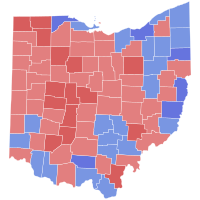 County results Young: 50–60% 60–70% Bricker: 50–60% 60–70% | |||||||||||||||||
| |||||||||||||||||
Incumbent Republican John W. Bricker was defeated in his bid for a third term by U.S. Representative Stephen M. Young.
| Party | Candidate | Votes | % | ±% | |
|---|---|---|---|---|---|
| Democratic | Stephen M. Young | 1,652,211 | 52.46% |  7.04 7.04 | |
| Republican | John W. Bricker (Incumbent) | 1,497,199 | 47.54% |  7.05 7.05 | |
| Majority | 155,012 | 4.92% | |||
| Turnout | 3,149,410 | ||||
| Democratic gain from Republican | |||||
Pennsylvania
edit | |||||||||||||||||
| |||||||||||||||||
| |||||||||||||||||
 County results Scott: 40-50% 50-60% 60-70% 70–80% Leader: 40–50% 50–60% | |||||||||||||||||
| |||||||||||||||||
Incumbent Republican Edward Martin did not seek re-election. The Republican nominee, Hugh Scott, defeated the term-limited Democratic Governor of Pennsylvania George M. Leader for the vacant seat.
| Party | Candidate | Votes | % | ±% | |
|---|---|---|---|---|---|
| Republican | Hugh Scott | 2,042,586 | 51.21% |  0.37% 0.37% | |
| Democratic | George M. Leader | 1,929,821 | 48.38% |  0.40% 0.40% | |
| Socialist Labor | George S. Taylor | 10,431 | 0.26% |  0.26% 0.26% | |
| Socialist Workers | Ethel Peterson | 5,742 | 0.14% |  0.14% 0.14% | |
| N/A | Other | 42 | 0.00% | N/A | |
| Majority | 112,765 | 2.83% | |||
| Turnout | 3,988,622 | ||||
| Republican hold | Swing | ||||
Scott would be twice re-elected, rising to the Senate Minority leader, and serve until retiring in 1977. Leader retired from public service after the defeat.
Rhode Island
edit | |||||||||||||||||
| |||||||||||||||||
| |||||||||||||||||
 County results Pell: 50–60% 60–70% | |||||||||||||||||
| |||||||||||||||||
Two-term incumbent Democrat John Pastore was easily re-elected over Republican attorney Bayard Ewing,[26] a repeat of their 1952 race.
| Party | Candidate | Votes | % | |
|---|---|---|---|---|
| Democratic | John Pastore (Incumbent) | 222,166 | 64.49% | |
| Republican | Bayard Ewing | 122,353 | 35.51% | |
| Majority | 99,813 | 28.98% | ||
| Turnout | 344,519 | |||
| Democratic hold | ||||
Ewing would later serve as the national chairman of the United Way (1969–1972) and the Rhode Island School of Design (1967–1985).
Tennessee
edit | |||||||||||||||||
| |||||||||||||||||
| |||||||||||||||||
 County results Gore: 40–50% 50–60% 60–70% 70–80% 80–90% >90% Atkins: 50–60% | |||||||||||||||||
| |||||||||||||||||
| Party | Candidate | Votes | % | |
|---|---|---|---|---|
| Democratic | Albert Gore Sr. (Incumbent) | 317,324 | 79.00% | |
| Republican | Hobart F. Atkins | 76,371 | 19.01% | |
| Write-In | Chester W. Mason | 5,324 | 1.33% | |
| Write-In | Thomas Gouge Jr. | 2,646 | 0.66% | |
| Majority | 240,953 | 59.99% | ||
| Turnout | 401,665 | |||
| Democratic hold | ||||
Texas
edit | |||||||||||||||||
| |||||||||||||||||
| |||||||||||||||||
 | |||||||||||||||||
| |||||||||||||||||
| Party | Candidate | Votes | % | |
|---|---|---|---|---|
| Democratic | Ralph Yarborough (Incumbent) | 587,030 | 74.58% | |
| Republican | Roy Whittenburg | 185,926 | 23.62% | |
| Write-In | Bard W. Logan | 14,172 | 1.80% | |
| Majority | 401,104 | 50.96% | ||
| Turnout | 787,128 | |||
| Democratic hold | ||||
Utah
edit | |||||||||||||||||||||
| |||||||||||||||||||||
| |||||||||||||||||||||
 County results Moss: 30–40% 40–50% 50–60% Watkins: 30–40% 40–50% 50–60% Lee: 40–50% 60–70% | |||||||||||||||||||||
| |||||||||||||||||||||
| Party | Candidate | Votes | % | |
|---|---|---|---|---|
| Democratic | Frank Moss | 112,827 | 38.73% | |
| Republican | Arthur V. Watkins (Incumbent) | 101,471 | 34.83% | |
| Independent | J. Bracken Lee | 77,013 | 26.44% | |
| Majority | 11,356 | 3.90% | ||
| Turnout | 291,311 | |||
| Democratic gain from Republican | ||||
Vermont
edit | |||||||||||||||||
| |||||||||||||||||
| |||||||||||||||||
 County results Prouty: 50–60% 60–70% Fayette: 50–60% 60–70% | |||||||||||||||||
| |||||||||||||||||
Incumbent Republican Ralph Flanders did not run for re-election to another term in the United States Senate. Republican candidate Winston L. Prouty defeated Democratic candidate Frederick J. Fayette to succeed him.
| Party | Candidate | Votes | % | ±% | |
|---|---|---|---|---|---|
| Republican | Winston L. Prouty | 31,866 | 64.6% | ||
| Republican | Lee E. Emerson | 17,468 | 35.4% | ||
| Republican | Other | 4 | 0.0% | ||
| Total votes | 49,338 | 100.00% | |||
| Party | Candidate | Votes | % | |
|---|---|---|---|---|
| Democratic | Frederick J. Fayette | 6,546 | 99.5% | |
| Democratic | Other | 32 | 0.5% | |
| Total votes | 6,578 | 100.00% | ||
| Party | Candidate | Votes | % | |
|---|---|---|---|---|
| Republican | Winston L. Prouty | 64,900 | 52.15% | |
| Democratic | Frederick J. Fayette | 59,536 | 47.84% | |
| N/A | Other | 6 | 0.00% | |
| Majority | 5,364 | 4.31% | ||
| Total votes | 124,442 | 100.00% | ||
| Republican hold | ||||
Virginia
edit | |||||||||||||||||
| |||||||||||||||||
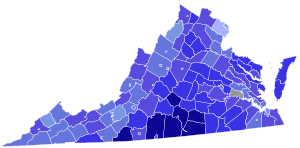 County and Independent City Results Byrd: 40-50% 50-60% 60-70% 70-80% 80-90% 90-100% | |||||||||||||||||
| |||||||||||||||||
Incumbent Harry F. Byrd Sr. was re-elected after defeating Independent Louise Wensel and Social Democrat Clarke Robb.
| Party | Candidate | Votes | % | ±% | |
|---|---|---|---|---|---|
| Democratic | Harry F. Byrd (Incumbent) | 317,221 | 69.32% |  4.03% 4.03% | |
| Independent | Louise Wensel | 120,224 | 26.27% |  26.27% 26.27% | |
| Social Democratic | Clarke T. Robb | 20,154 | 4.40% |  7.98% 7.98% | |
| Write-in | write-ins | 41 | 0.01% |  1.54% 1.54% | |
| Majority | 196,997 | 43.05% | |||
| Turnout | 457,640 | ||||
| Democratic hold | |||||
Washington
edit | |||||||||||||||||
| |||||||||||||||||
| |||||||||||||||||
 County results Jackson: 50–60% 60–70% 70–80% 80–90% | |||||||||||||||||
| |||||||||||||||||
| Party | Candidate | Votes | % | |
|---|---|---|---|---|
| Democratic | Henry M. Jackson (Incumbent) | 597,040 | 67.32% | |
| Republican | William B. Bantz | 278,271 | 31.38% | |
| Socialist Labor | Henry Killman | 7,592 | 0.86% | |
| Constitution | Archie G. Idso | 2,257 | 0.25% | |
| United Liberals and Socialists | Jay G. Sykes | 1,662 | 0.19% | |
| Majority | 318,769 | 35.94% | ||
| Turnout | 886,822 | |||
| Democratic hold | ||||
West Virginia
editWest Virginia (regular)
edit | |||||||||||||||||
| |||||||||||||||||
 County results Byrd: 50–60% 60–70% 70–80% Revercomb: 50–60% 60–70% 70–80% | |||||||||||||||||
| |||||||||||||||||
In 1956, senator Harley M. Kilgore died, and former senator William Revercomb won his seat in the 1956 special election. Revercomb sought re-election to a third term, but was defeated by Congressman Robert Byrd. This election was the beginning of Byrd's lifelong career in the Senate.
[1][30]| Party | Candidate | Votes | % | ±% | |
|---|---|---|---|---|---|
| Democratic | Robert Byrd | 381,745 | 59.19% | +18.39% | |
| Republican | William Revercomb (Incumbent) | 263,172 | 40.81% | -18.39% | |
| Total votes | 644,917 | 100.00% | -21.5% | ||
| Democratic gain from Republican | |||||
West Virginia (special)
edit | |||||||||||||||||
| |||||||||||||||||
| |||||||||||||||||
 County results Randolph: 50–60% 60–70% 70–80% Hoblitzell: 50–60% 60–70% 70–80% | |||||||||||||||||
| |||||||||||||||||
Incumbent Democrat Matthew M. Neely died of cancer January 8, 1958, and Republican John D. Hoblitzell Jr. was appointed January 25, 1958, to continue the term, pending a special election.
Former Democratic congressman Jennings Randolph was elected to finish the term that would run through 1961. Byrd however, would become the senior Senator from West Virginia as he was elected to his first full six year term.
| Party | Candidate | Votes | % | |
|---|---|---|---|---|
| Democratic | Jennings Randolph | 374,167 | 59.32% | |
| Republican | John D. Hoblitzell Jr. (Incumbent) | 256,510 | 39.77% | |
| Total votes | 630,677 | 100% | ||
Randolph would be re-elected four times and serve until his retirement in 1985. Hoblitzell resumed his business interests and died January 6, 1962.
Wisconsin
edit | |||||||||||||||||
| |||||||||||||||||
| |||||||||||||||||
 County Results Proxmire: 50–60% 60–70% 70–80% | |||||||||||||||||
| |||||||||||||||||
| Party | Candidate | Votes | % | |
|---|---|---|---|---|
| Democratic | William Proxmire (Incumbent) | 682,440 | 57.12% | |
| Republican | Roland J. Steinle | 510,398 | 42.72% | |
| Socialist Workers | James E. Boulton | 1,226 | 0.10% | |
| Socialist Labor | Georgia Cozzini | 537 | 0.04% | |
| None | Scattering | 77 | 0.01% | |
| Majority | 171,042 | 14.40% | ||
| Turnout | 1,194,678 | |||
| Democratic hold | ||||
Wyoming
edit | |||||||||||||||||
| |||||||||||||||||
| |||||||||||||||||
 County results McGee: 50–60% 60–70% 70–80% Barrett: 50–60% 60–70% | |||||||||||||||||
| |||||||||||||||||
| Party | Candidate | Votes | % | |
|---|---|---|---|---|
| Democratic | Gale McGee | 58,035 | 50.84% | |
| Republican | Frank A. Barrett (Incumbent) | 56,122 | 49.16% | |
| Majority | 1,913 | 1.68% | ||
| Turnout | 114,157 | |||
| Democratic gain from Republican | ||||
See also
editNotes
edit- ^ Maine election held on September 8, 1958; Alaska elections held on November 25, 1958.
- ^ a b The Liberal Party in New York endorsed Frank Hogan, a Democrat, but the Clerk of the U.S. House of Representatives did not tabulate their votes, totaling 275,051, into the national Democratic total.[1]
- ^ Appointee elected
- ^ Appointee defeated
References
edit- ^ a b c d e f g h i j k l m n o p q r s t u v w x y z aa Clerk of the U.S. House of Representatives (March 16, 1959). "Statistics of the Presidential and Congressional Election of November 4, 1958" (PDF). U.S. Government Printing Office. p. 27, 39, 42.
- ^ "Our Campaigns - AK US Senate Race - Nov 25, 1958". www.ourcampaigns.com. Retrieved June 12, 2020.
- ^ "Our Campaigns - AK US Senate Race - Nov 25, 1958". www.ourcampaigns.com. Retrieved June 12, 2020.
- ^ "Our Campaigns - CT US Senate Race - Nov 04, 1958". www.ourcampaigns.com.
- ^ Egerton, John (November 29, 1981). "COURTLY CHAMPION OF AMERICA'S ELDERLY". The New York Times. Retrieved August 15, 2019.
- ^ "Our Campaigns - FL US Senate - D Primary Race - Sep 09, 1958". www.ourcampaigns.com. Retrieved June 11, 2020.
- ^ "Our Campaigns - FL US Senate Race - Nov 04, 1958". www.ourcampaigns.com. Retrieved June 11, 2020.
- ^ a b Gugin, Linda C.; St. Clair, James E, eds. (2006). The Governors of Indiana. Indianapolis, Indiana: Indiana Historical Society Press. p. 333. ISBN 0-87195-196-7.
- ^ "Our Campaigns - MN US Senate - D Primary Race - Sep 09, 1958". www.ourcampaigns.com.
- ^ "Primary Election Returns on Election held September 9, 1958" (PDF). Minnesota Legislature.
- ^ "Our Campaigns - MN US Senate Race - Nov 03, 1964". www.ourcampaigns.com.
- ^ "MO US Senate – D Primary". OurCampaigns. Retrieved August 15, 2019.
- ^ "MO US Senate – R Primary". OurCampaigns. Retrieved August 15, 2019.
- ^ "MO US Senate Race". OurCampaigns. Retrieved August 12, 2019.
- ^ a b "Report of the Official Canvass of the Vote Cast at the Primary Election Held in the State of Montana, June 3, 1958" (PDF). Montana Secretary of State. Archived from the original (PDF) on December 28, 2013. Retrieved July 2, 2014.
- ^ a b c d e "Statistics of the Presidential and Congressional Election of November 4, 1958" (PDF). Clerk of the United States House of Representatives. Retrieved July 4, 2014.
- ^ a b Official Report of the Board of State Canvassers of the State of Nebraska (primary election). Available at: https://sos.nebraska.gov/elections/previous-elections
- ^ a b c d Driggs, Don W. (March 1959). "The 1958 Election in Nevada". The Western Political Quarterly. 12 (1): 317–321. doi:10.2307/444059. JSTOR 444059.
- ^ "NV US Senate - D Primary". OurCampaigns. Retrieved August 12, 2019.
- ^ "NJ US Senate - D Primary". OurCampaigns. Retrieved August 12, 2019.
- ^ "NJ US Senate - R Primary". OurCampaigns. Retrieved August 12, 2019.
- ^ "NJ US Senate Race". OurCampaigns. Retrieved August 12, 2019.
- ^ "NY US Senate - D Convention". Our Campaigns. Retrieved March 12, 2020.
- ^ "Our Campaigns - NC US Senate - Special Election Race - Nov 04, 1958". www.ourcampaigns.com. Retrieved June 12, 2020.
- ^ "OH US Senate". OurCampaigns. Retrieved August 12, 2019.
- ^ Lambert, Bruce (November 1, 1991). "Bayard Ewing, 75, Ex-U.S. Chairman Of the United Way". The New York Times. ISSN 0362-4331. Retrieved June 12, 2020.
- ^ Election Returns: November 4, 1958, Texas Secretary of State election registers. Archives and Information Services Division, Texas State Library and Archives Commission. pp. 481–486
- ^ a b "Primary Election Results" (PDF). Office of the Vermont Secretary of State. Retrieved June 16, 2015.
- ^ "General Election Results - U.S. senator - 1914-2014" (PDF). Office of the Vermont Secretary of State. Archived from the original (PDF) on March 4, 2016. Retrieved June 16, 2015.
- ^ "WV US Senate". Retrieved January 12, 2019.
- ^ "1958 General Election" (PDF). Historical Election Results and Turnout. Secretary of State of West Virginia. Retrieved June 13, 2020.

